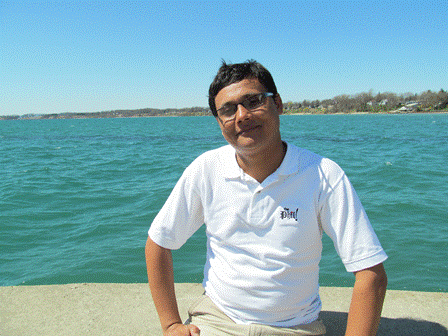This is the second installment of a monthly feature on the PACS website. This monthly profile of PACS and MPACS students will give a small snapshot into the pursuits and experiences of our PACS students.
Dreams are like horizons, they keep shifting. When you make the journey and reach the horizon, from that point you will see another horizon to reach towards.

Hari’s journey to the MPACS program started in Nepal. Having grown up in a small village in Western Nepal, his first goal was to to get an education by moving to Kathmandu, the capital of Nepal. At first Hari considered becoming a doctor, but then decided to switch to the humanities so he could study while working as a teacher. He received his Bachelors and Master’s in English from the same university inKathmandu and started teaching English there for several years.
But Hari didn’t want to stay with English. Throughout his life, he had seen for himself the harmful effects of discrimination against women, Dalits and disabled people, social injustice, poverty, and other types of injustices. Because of this, he switched into the social sciences and started to work for the Indian Embassy in Kathmandu by monitoring print and electronic media for issues that are important for India. After two years at the Embassy, Hari started working for the BBC World Service Trust and worked on several television and radio programs that facilitated political conversation between politicians and citizens, addressed discrimination through a radio drama, and educated about health and sanitation in rural areas.
Through this work, Hari realized he wanted to gain critical knowledge in this area of peace, conflict, and social justice politics; this was his area of passion, what he would spend hours conversing with his friends about, and what he experienced personally as he grew up. It only made sense to make it a focus of his studies. And that is how Hari ended up here, doing an MPACS degree at Conrad Grebel.
Hari has been enjoying his first two terms here at Grebel. One aspect of his studies that struck a chord has been the theoretical concepts discussed in class. These concepts in the classroom mirrored his lived experience, particularly in the difficulty of coming into a country that is foreign to you as a peacebuilder and trying to understand the local dynamics of the conflict. In our conversation he gave an interesting example of peace negotiations taking place in Nepal after a decade of armed conflict. The government of Nepal was considering solving the problem of managing rebel groups by sending combatants home with a sum of money. The international community did not support this idea, saying that the rebels would use that money to buy weapons and exacerbate the conflict. However, in the end Nepal employed its solution of sending combatants home with money and nothing happened; they used their money to buy necessities for their families, like land or a house. Because the international community was not familiar with the internal dynamics of the region, they could not see the solution.
After Hari graduates from MPACS, he plans to do a PhD in Peace and Conflict Studies or a related discipline, as well as learn more about political, social, and cultural life here in Canada. When he’s not studying PACS, he spends time with his wife and daughter, plays tennis, stays up to date on world issues, and enjoys experimenting with different foods in his cooking.